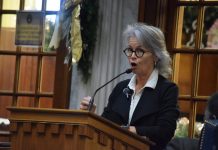On Sunday, Attorney General Curtis Hill filed documents appealing a federal district court’s Friday ruling that an abortion provider may open a South Bend clinic without a license. Attorney General Hill also asked for an immediate stay that would prevent the unlicensed clinic from opening until Indiana’s appeal can be considered.
In March, Texas-based Whole Woman’s Health Alliance asked the district court to issue a preliminary injunction allowing it to open a clinic without first obtaining the standard approval from the Indiana State Department of Health (ISDH). The ISDH previously has denied Whole Woman’s Health a license after the entity failed to provide requested documentation about the safety record of affiliated clinics in other states and other information.
The proposed South Bend clinic would provide chemical abortions – procedures in which one type of medication is used to kill the fetus after which another is administered to induce the woman to expel it.
In its preliminary injunction ruling, the district court held that requiring Whole Woman’s Health to obtain a license would, with all the administrative hassle, impose an undue burden on women seeking abortions.
“This federal judge seems to believe that every large city in the state is entitled to its own abortion clinic,†Attorney General Hill said. “She further seems to think that state licensing requirements must give way whenever a clinic proposes to open in a city without one. The U.S. Supreme Court has never even remotely implied that such a rule exists.â€
Allowing the operation of unlicensed abortion clinics could cause harm to patients, Attorney General Hill added.
“This is a facility that would dispense medication that ends a pregnancy and causes women to expel fetal remains,†he said. “This course of treatment may cause substantial loss of blood and may prompt years of regret, depression and other emotional harm to women.â€
Indiana has good reasons for requiring abortion clinics to be licensed, Attorney General Hill said, such as the state’s interest in protecting the health of the mother and preserving the life of the fetus.
“Criminal and civil penalties can only punish violations of the law after they occur,†he said. “Licensing makes violations less likely to happen in the first place. This is precisely why states have licensed the legal and medical professions since the mid-nineteenth century. Requiring abortion clinics to be licensed facilities is entirely reasonable and constitutional. For that matter, it’s the very least we should do to protect the health of women and unborn children.â€




